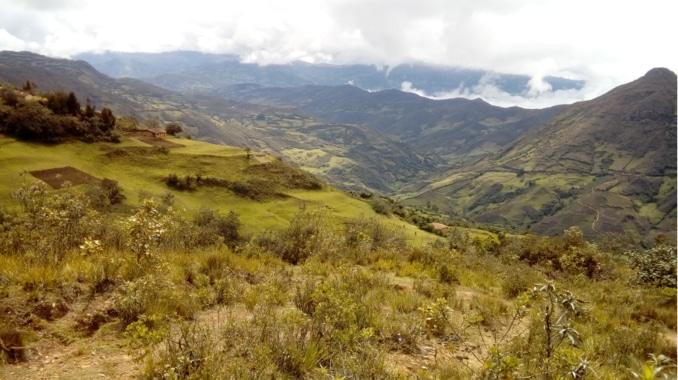Treeapp Partners with a Local NGO
Treeapp is excited to announce its newest partnership with the NGO ReNaSCEDD, a local reforestation organisation in West Africa striving to increase forest cover in Guinea.
From 4th August 2020, users on Treeapp will be able to plant in Guinea, an African country sharing its coastal border with Guinea-Bissau and Sierra Leone.
Photo: World icon showing Guinea
Guinea’s Current Climate
This is our first partnership with an organisation in West Africa, a region that is particularly vulnerable to climate change. Varying temperature and rainfall patterns have dramatically affected the agricultural sector which employs over 80% of the country’s population.
Guinea’s tropical climate is characterised by considerable precipitation between May and October, a wet season ideal for planting trees and crops. During recent years, however, the weather conditions have become less predictable and total rainfall during the growing season has been on the decline (1) . Achieving a consistent yield during the harvesting season is becoming progressively challenging as many of the farms are not equipped with irrigation methods and locals rely on the wet periods for subsistence farming.
Many factors are at play when it comes to Guinea’s changing climate. Excessive logging for timber and firewood, agricultural production and mining activities are some of the commercial activities that have cut deep into Guinean Woodlands. And forests across the country play a fundamental role in sustaining the various microclimates: they have shown to cause more evaporation of moisture than oceans, making them an important factor in generating rainfall and cooling the local climate. In addition, the loss of vegetation accelerates the process of soil erosion, reducing the soil’s fertility and hence declining agricultural productivity.
Planting Trees to Mitigate Climate Change
To reverse the trend of land degradation, our local partner ReNaSCEDD headed by Sékou Amadou Diakite is active in 8 districts in Guinea. The NGO works towards conserving nature by reforesting areas and creating sustainable solutions for agroforestry – the farming of fruit and nut trees. In 2019, the organisation managed to create jobs for 100 local residents, a milestone signalling support from donors and from the local communities alike.
Photo: ReNaSCEDD employees carrying out field work in Boffa, July 2020
Boffa is one of the prefectures, located on Guinea’s coast, which has been facing a worrying rate of deforestation activities. Two-thirds of woodlands have been destroyed due to an increase in mining activities, rice cultivation and salt production.
As Boffa borders the river Pongo which flows into the Atlantic Ocean, the NGO places a particular emphasis on the planting of Mangrove trees. Mangroves grow in swamps and have a particularly high salt-tolerance allowing them to thrive in harsh coastal conditions. They counter the effects of waves and wind on shorelines as their tangled root systems stabilise soil. Without them, the bare earth is washed away into the sea. Mangrove swamps also serve as an important source of “blue carbon” – a term coined to describe the carbon stored specifically in coastal and marine ecosystems. Storing carbon in plants ensures that the temperature of the atmosphere does not warm up.
But mangrove estuaries are highly dependent on local communities to grow and to thrive. Often, fish farming and shrimp ponds allow for lucrative business opportunities and are cultivated at the expense of mangrove sites. In order to prevent areas from being farmed extensively, ReNaSCEDD is working towards creating larger swamps and safeguarding those that already exist.
Photo: Planting young trees into the ground in Mamou, July 2020
ReNaSCEDD also plants a variety of agroforestry trees such as mango, avocado and lemon trees in the districts Kindia, Mamou and Boké. The planting project enlists the help of locals who reap the benefits over years to come. Harvesting the fruits provides a means for subsistence farming as well as an opportunity for commercial output. Planting fruit trees has additional benefits as well: their roots create a habitat for microorganisms in the ground which fertilise agricultural grounds, improving the soil for root vegetables to grow.

Photo: Icons of fruit trees planted in Guinea
To ensure a high survivability of trees, ReNaSCEDD plants in large tree nurseries before planting the seedlings into the ground. By doing so, the organization can prevent seeds from being damaged as a result of strong winds, heavy rainfall, drought or animals roaming the designated planting areas. During the months of June and August each year the saplings (young trees) are moved to the planting sites. The NGO is currently working on establishing tree nurseries for 300,000 plants by the end of 2020.
It’s time to invest in Guinea’s future
ReNaSCEDD is also keen on spreading awareness and training their communities with the skills to plant trees themselves. This is why the NGO has launched an Environmental Education program in Kaback to teach children important concepts of sustainable forest management. This activity promotes behaviour change and supports a more sustainable way of thinking.
Localised knowledge on competing sectors and strong ties to authorities further ensure that ReNaSCEDD remains in charge of their planting areas. The NGO teaches locals about the obligations of mining companies towards communities as well as how to create and sustain healthy relations between businesses and the interests of the local population. The multi-faceted approach carried out by this organization ensures that their impact will be felt over decades to come. Treeapp will be working closely with ReNaSCEDD in order to support their planting mission in Guinea.
Are you excited to join the reforestation movement in Guinea? Support the planting efforts and download Treeapp to start planting today!
(1) - Loua, R. T., Beavogui, M., Bencherif, H., Bamba, Z., & Amory-Mazaudier, C. (2017). Climatology of Guinea: Study of Climate Variability in N’zerekore. Journal of Agricultural Science and Technology (JAST), 7(4).
